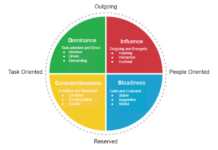
The workplace is filled with awkward situations that are hard to discuss. Perhaps there’s been an unpleasant exchange between co-workers and there’s a lingering undertone of anger. Maybe someone didn’t get the expected promotion and remain disappointed. Perhaps market conditions mean that bonuses were cut out this year. Maybe it’s best to not say anything? Maybe it will create an upset if we mention a touchy subject? Maybe it’s best to pretend like there’s nothing wrong? We are tempted to brush a big upset under the rug except that it doesn’t fit under the rug. It is an elephant, and elephants don’t hide well. Plus, ignoring the elephant creates threat in the brain.
Research indicates that suppressing an upsetting emotion further activates the threat response. Acknowledging the upset settles the brain. Consequently, it’s better to bring the elephant into the room and use one of these techniques to escort it out.
I’ve had first-hand experience with this lately at a personal level. My husband died several weeks ago. This large elephant follows along behind me. I’m out and about in the work world now and notice varying ways that people address my personal elephant – some effective, others not. My observations are relevant to the workplace elephants, too.
Talk about the elephant first. You walk into round-two of a meeting where round-one ended in an upset. Do you ignore it and move on? No – it’s best to address the elephant early. You say, “I know our last meeting ended badly and emotions were high. Let’s start today by reiterating the common ground and summarizing our differences so that we can address them constructively.” You recognize the elephant and calmly provide a way to address it and move on. For my elephant, this is the person who doesn’t shy away from the topic of my husband’s death. They bring it up immediately. Honestly, approach is a relief because we address the obvious and move on.
Acknowledge the elephant and set it aside for later. You have an employee who expected the big promotion but wasn’t selected. Her disappointment is palpable. Still, you need to talk about her ongoing work status. You say, “I expect that you feel some disappointment about the promotion. I’d like to set up a time to talk more about your thoughts and feelings so that we can move forward in a way that is good for you and the company. In the meantime, I’d like to continue our work on xyz project.” In this case, you explicitly address the elephant and provide a forum to address it. In my case, this is the person who immediately acknowledges my loss and asks to hear more after the meeting.
Ask if talking about the elephant would be helpful. You heard about two employees who had an angry disagreement again and you run into one of them shortly afterward. You say, “I heard you and Joe had a disagreement. Would it be helpful to talk about it? I don’t want to pretend that everything is okay when it isn’t.” This option doesn’t ignore the problem and gives the choice to the impacted person. For me, this is like someone asking if I would like to talk about my husband.
The common theme is: Address the elephant; don’t ignore it. Pretending that all is okay when it isn’t only makes the situation worse.
For me, I miss my husband terribly and I’m adjusting slowly. Thanks for asking.
For more insights on communication, leadership and more, visit ShelleyRow.com.





